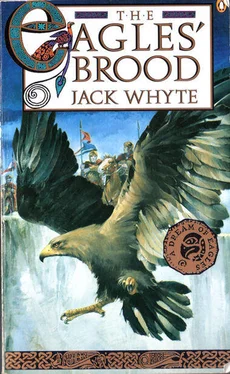"Sick with an aching head?" I grinned at him again. "No, really. I told you I intend to leave at first light and I meant it. I also intend to leave clear-headed, so accept my thanks for the offer and my regrets. I agree with you about disturbing Donuil, however. I have to write a letter to my brother, and Donuil may as well sleep until I've done it. Good night, Lucanus. Sleep well."
I had no sleep that night, listening to the thrashing rain, and the second hour before dawn found me walking, fully dressed save for my boots and cloak, through the darkened house towards the room that housed Publius Varrus's treasures and his books. There, by the light of my solitary lamp, I toured the walls slowly, looking at the ancient weapons that hung there and remembering my great-uncle and the way he had loved and treasured these antique symbols of man's dexterity and ingenuity. Reaching his great African bow, layered of wood and horn and sinew, I took it down from the pegs that held it and tested its spring in my outstretched hands. It was as supple and mighty as ever. Donuil had replaced it here after bringing me back to Camulod from the Mendip Hills, two years before. It had not been oiled or polished, I could see, in at least half that time, but it had evidently not suffered from the neglect. A quiver full of long, carefully fletched arrows hung beside it, and I took that down as well. A small drawer in the table directly beneath, against the wall, held a supply of bowstrings made from stretched sinew, each wrapped and tied with care. I took all eight of them, dropping them into my scrip, then crossed the room again to lean the bow stave and quiver by the doors, where I could pick them up on my way out.
Finally, unable to postpone the moment longer, I took down the wooden hammer keys and used them to uncover the long, polished case that lay hidden, coated with dust, beneath the floorboards. Moments later, Excalibur sat firmly in my grasp, thrilling me with its power. I sat there on the floor, my legs dangling in the hole at my feet, and raised the sword above my head, watching the light from my lamp reflected in its glittering silver blade, and turning it this way and that to catch the ripples of refraction along its planes. Every detail of that magic, long-gone day, the first time I had seen this wonder, passed through my mind. I drew the hilt close to my eyes and examined again the perfect symmetry of the huge gold cockle-shell that was its pommel, and I flexed my fingers around the wire-latticed grip, made from the belly skin of a great shark. With the tip of my finger I traced the Celtic scrollwork on the broad cross hilt, trying in vain to detect the edges of the silver leaf covering that coated the bronze. And I heard again the voice of Publius Varrus from his death bed, instructing me in my duties concerning this wondrous weapon, which he had made with his own hands. As I listened to those words, whispered from the depths of my soul and my memory, so newly returned to me, the exhilaration I had felt seeped out of me to be replaced by a creeping nausea. I might never look upon this wondrous sword again. With the approaching dawn, I would ride out in search of vengeance, hunting the grandson of the man who had made it. Only one of us, and perhaps neither one, would return alive. But if I died, Excalibur, my sworn and sacred trust, would remain here, concealed from all eyes and therefore useless forever. That could not, must not be so.
Today I can find some tiny cause for pride—a very tiny cause, insignificant against the monstrous anger that consumed me at the time—that it did not occur to me to take the sword with me. I could not even then, in my swamping bitterness, conceive of using the sword Publius Varrus had made to kill the son of the child Publius Varrus had fathered. No matter how obscene I considered Uther's sins to be—knew them to be—I would never have thought to kill him with Excalibur.
Slowly, and sick with the knowledge of what I had to do, I laid the. gleaming blade gently in its sculpted bed, then closed the lid, hiding the sword from my eyes again for what I felt might be the last time, and carefully wiped off the dust from the polished lid. That done, I lowered the case carefully back into its hiding-place and resealed it beneath the floor-boards. Then I crossed to my great-uncle's writing desk, where I used my lamp to light more tapers, after which I found pens, ink and parchment and began to write. By the time I had finished, although it was still darkest night, my fingers ached from the unaccustomed effort of holding die pen.
I wakened Donuil in the pre-dawn blackness, when there was still no sign of light in the sky to the east. He was surprised to see me up and about before him and I did not bother to explain. I placed my lamp on the table by the door of his sleeping chamber and perched on the edge of his bed, where I repeated the now familiar story of my coming odyssey in search of myself. I repeated the explanation of how I perceived the need for Camulod and Ambrose to be brought together, and explained to him why I wished him to go in search of Ambrose, wherever he was to be found. I also told him in detail the message I wished him to relay to my half-brother, and then listened while he repeated it back to me. I instructed him to take two companions with him, the centurion Rufio and Curwin the bowman, and to be careful on the road. I myself, I told him, would probably be gone for no more than a week or two, after which I must return to Camulod and to my duties. His search for Ambrose, on the other hand, might take months.
Finally, when I was convinced he knew what I required of him, I gave Donuil the letter I had written and with it my instructions, taking pains to make it clear to him that I was merely taking precautions against a premonition I had dreamed of, and no more than that. He would give the letter to my aunt in the morning, bidding her keep it sealed and safe. In the highly unlikely event that I had not returned to Camulod within a year from this date, she was to give the letter to Ambrose and remain with him while he read it. And if, for any reason, Ambrose had not come to Camulod, she was to do the same with Uther; failing Uther, with Titus or Flavius or the senior officer in command at that time.
Donuil was mystified by my instructions, but I did not enlighten him. In my own mind, I had done all I could do, and I had no options. My responsibility was clear. If Uther were here two years from now and I were not, then I would be dead and Excalibur, for better or for worse, would be rightfully his. If neither of us returned, this way at least the weapon would remain in Camulod and might, some day, fulfill its original purpose. I watched as Donuil locked the letter safely in his chest, then I made my way to the stables, where I took time to ensure that my various possessions, including Publius Varrus's great bow, were securely stowed, fastened and wrapped against the elements.
In recognition of the foulness of the weather, I lashed a thin, tightly rolled, straw-filled palliasse behind my saddle, having wrapped it in a firmly bound length of the same material from which my foul-weather cloak was woven:
dense-fibred brown wool, thick and springy, with a waterproof texture that was strengthened by a scraping of rendered wax. My great black war cloak with the embroidered bear on the back was folded in a pannier on the pack-horse, protected by a covering of the same waxed wool and safe from rain, damp and mildew. Finally satisfied that everything I could do had been done, I mounted the big black that had once been my father's, and as I clattered over the cobblestones and through the main gates leading the pack-horse and an extra mount, two lonely, chilled, wet sentries were the only ones to mark my passing.
XXXIX
On leaving Camulod, I rode directly east along our own well-used roadway until it intersected the great north-east to south-west road built four hundred years earlier by the soldiers of Julius Agricola. From there I headed directly southwest. Uther had led out his two thousand men by the same route, although all signs of their passing had been blotted out months earlier, long before the fury unleashed by the lashing rain that had begun the day before I left and poured without respite for the next three days. As night was falling, I approached the tiny town the native Celts were now calling Ilchester. Apart from its unmistakable layout, nowadays the town bore little resemblance to anything Roman, and the original fortifications were almost completely obliterated already. It was a dismal, squalid little place where nothing ever happened, and yet no one I asked there showed any awareness of Uther's having passed through three months earlier, which led me to infer that he had skirted the town, preferring to keep his movements secret from the citizenry. I spent the night there, despite the threat of verminous bedding, determined to enjoy the dryness of a roof over my head for what might well be the last time for several nights. I pressed south again in the morning, making only slow headway, however, against the driving rain.
Читать дальше









